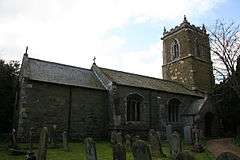South Cockerington
| South Cockerington | |
 Church of St Leonard, South Cockerington |
|
 South Cockerington |
|
| Population | 245 (2011)[1] |
|---|---|
| OS grid reference | TF381892 |
| – London | 135 mi (217 km) S |
| District | East Lindsey |
| Shire county | Lincolnshire |
| Region | East Midlands |
| Country | England |
| Sovereign state | United Kingdom |
| Post town | Louth |
| Postcode district | LN11 |
| Police | Lincolnshire |
| Fire | Lincolnshire |
| Ambulance | East Midlands |
| EU Parliament | East Midlands |
| UK Parliament | Louth and Horncastle |
|
|
Coordinates: 53°22′54″N 0°04′33″E / 53.381795°N 0.075740°E
South Cockerington is a village and civil parish in the East Lindsey district of Lincolnshire, England. It is situated approximately 4 miles (6 km) east from the market town of Louth.
The parish church is a Grade I listed building dedicated to Saint Leonard dating from the early 14th century, and restored in 1872-73. It is built from greenstone, limestone and brick. Inside there is a 15th-century font, and an alabaster monument to Sir Adrian Scrope who died in 1623, attributed to Epiphanius Evesham.[2]
South Cockerington Hall was demolished in 1926.[3]
In the village were four almshouses which are now a Grade II listed house, dating from about 1890, built in red brick.[4]
See also
References
- ↑ "Parish population 2011". Retrieved 19 August 2015.
- ↑ Historic England. "St Leonards church, South Cockerington (1309123)". National Heritage List for England. Retrieved 20 July 2011.
- ↑ "Cockerington Hall". Englands Lost Country Houses. Matthew Beckett. Retrieved 20 July 2011.
- ↑ Historic England. "Almshouses, South Cockerington (1359974)". National Heritage List for England. Retrieved 20 July 2011.
External links
 Media related to South Cockerington at Wikimedia Commons
Media related to South Cockerington at Wikimedia Commons- "South Cockerington", Genuki.org.uk. Retrieved 27 October 2011
This article is issued from Wikipedia - version of the 8/19/2015. The text is available under the Creative Commons Attribution/Share Alike but additional terms may apply for the media files.